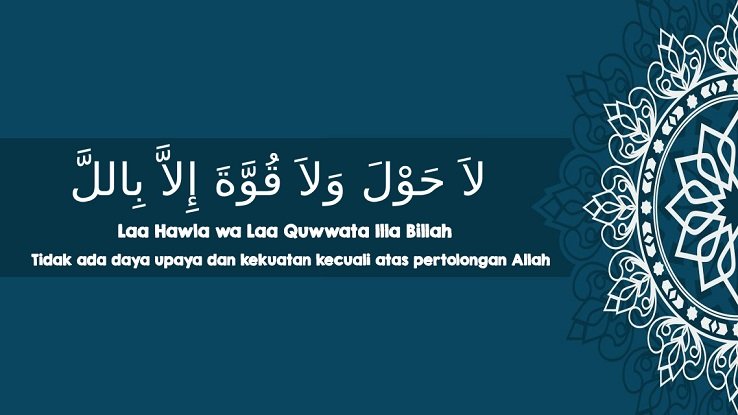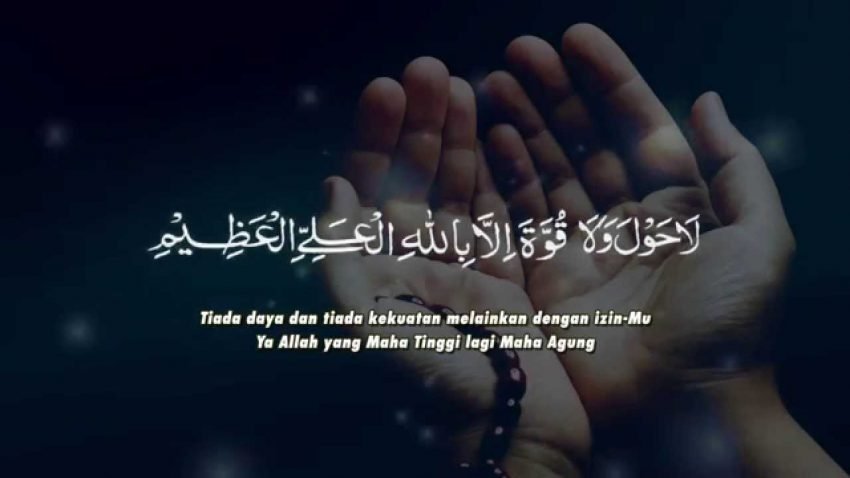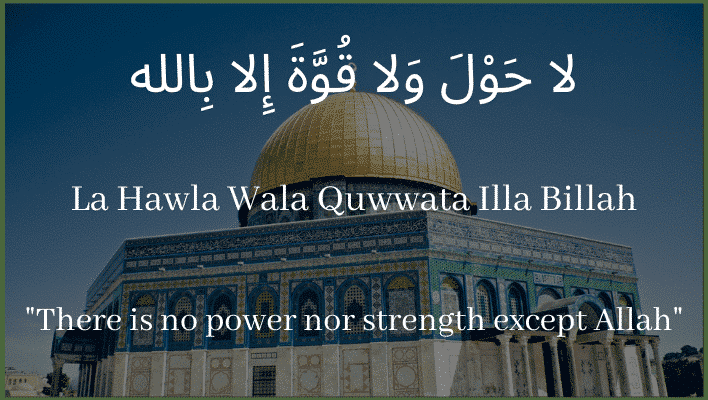Some phrases are of a unique value for Mslims, la hawla wala quwwata illa billah you may hear it but what does itexactly means to say la hawla wala quwwata illa billah and when to say it?
Read on to get a full understanding.
La Hawla Wala Quwwata in Arabic&English
لا حَوْلَ وَلا قُوَّةَ إِلا بِالله
English Meaning
“There is no power nor strength except Allah.”
According to this verse, until Allah grants them, no one else has more power or might than Allah.
La Hawla Wala Quwwata Benefits
The individual who recites this dua will be relieved of his trials, anguish, and difficulties since it is the medication and cure for 99 disorders.
It is one of the Jannah’s portals – Tirmidhi – and one of the Jannah’s riches – Sahi Bukhari. So whoever loves it will enter Jannah.
According to a story (riwayat), every time you say this Dua in its entirety, an angel descends to bestow Shifa onto you (cure).
Whoever carefully recites it every day would be secure from 70 Balayen (spiritual tribulations and afflictions).
If someone attentively recites it, Allah will erase his poverty and make him self-sufficient.
Allah will erase the Mohtajgi of the individual who recites La Hawla Wala Quwwata Illah Billah 100 times every day (poverty).
Reciting it will bring you Rizq (sustenance), and if you are jobless and without work, reciting it will open several avenues for Rizq.

When should we say “La hawla wa la quwwata illa Billah”?
This remark is spoken when a person is confronted with a terrible situation he cannot handle or when he is confronted with something really tough to deal with. (Al-Humayd Shaykh Sa’d)
This sentence is used on the following occasions:
When turning over at night:
“Whoever rolls over at night and says La ilaha ill-Allah wahdahu la shareeka lah, lahu’l-mulk wa lahu’l-hamd wa huwa ‘ala kulli shay’in qadeer,” ‘Ubadah ibn al-Samit stated. Alhamdullah wa subhaan-Allah wa la ilaha ill-Allah wa Allahu akbar, wa La hawla wa la quwwata illa Billah (There is no deity but Allah Alone, without associates or partners. Praise belongs to Him, and His dominion is absolute, and He is capable of doing everything. Allah be praised, Allah be glorified; there is no deity but Allah, and Allah is Most Great. There is no power or strength but in Allah), then he should say, Allahumma ighfir li (O Allah, pardon me), or perform du’a, and his prayer would be fulfilled. His salah will be recognised if he does wudu and prays.” (Al-Bukhari, 1086)

When the muadhdhin says “Hayya ‘ala’s-salaah (come to prayer)” or “Hayya ‘ala’l-falah (come to success)”
Hafs ibn ‘Asim ibn ‘Umar ibn al-Khattab related through his father that the Messenger of Allah (peace and blessings of Allah be upon him) said: ‘When the muadhdhinin say, ‘Allahu akbar, Allahu akbar,’ and one of you says, ‘Allahu akbar, Allahu akbar,’ then he says, ‘A (M narrates)
When leaving one’s house
“Whoever says – i.e., when he is leaving his house – ‘Bismillah, tawwakaltu ‘ala Allah, La hawla wa la quwwata illa Billah (In the name of Allah, I place my trust in Allah, and there is no power or strength except with Allah),” it will be said to him, ‘You are protected and cared for,’ and the Shaytan will leave him alone (Al-Tirmidhi narrates this in his Sunan, 3348. According to Abu ‘Isa, this is a hasan saheeh ghareeb hadeeth that we only know about because of this isnad. Al-Saheeh Albani’s al-Jami’, 6419. It was also recounted by Abu Dawood in his Sunan (4431), where he adds: “And another shaytan asks to him, ‘What can you do with a guy who has been led, safeguarded, and cared for?'”)
After praying
“La ilaha ill-Allah wahdahu laa shareeka lah, lahu’l-mulk wa lahu’l-hamd wa huwa ‘ala kulli shay’in qadeer,” Abu’l-Zubayr said. The hawla wa the quwwata illa Billah wa the na’budu illa iyyah Al-hasan lahu’l-ni’mah wa lahu’l-fadl wa lahu’l-thana’. La ilaha ill-Allah mukhliseena lahu’l-deena wa la ilaha ill-Allah mukhliseena lahu’l-kaafiroon (There is no deity but Allah Alone, without associates or partners. His is the dominion; thanks be to Him, because He is capable of doing everything. There is no power or strength other from Allah, and we worship Him alone. All benefits and favours flow from Him (alone), and all praise is due to Him. There is no deity but Allah, and we devote our devotion exclusively to Him (alone), regardless of how much disbelievers despise this.’ ‘The Messenger of Allah (peace and blessings of Allah be upon him) used to recite these words immediately after each prayer,’ he said. (Muslim, in his Saheeh, 935)




